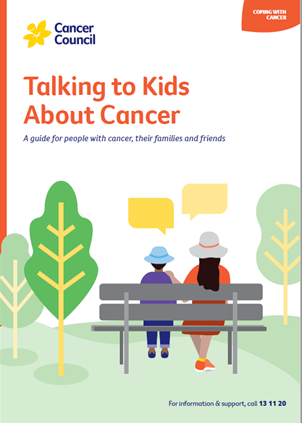- Home
- About Cancer
- Family and friends
- Talking to kids about cancer
- After treatment
- Answering common questions after treatment
Answering common questions after treatment
Here are some answers to questions your children might ask after your cancer treatment ends.
You probably wish you could tell your children that everything will be fine now, but the uncertainty of cancer often lasts long after treatment is over. Along with giving your children a hopeful message, this may be a chance to listen to their concerns about “What if?”. Allowing children to talk about their fears and concerns is important in helping them cope.
A: “The treatment is over and we all hope that will be the end of it. We hope that the cancer won’t come back, but the doctors will keep a careful eye on the cancer with check-ups every now and then. If the cancer does come back, I will have some more treatment, which we hope would make it go away again. We’ll let you know if that happens.”
Cancer survivors often feel tired for many months after treatment. This can be hard for kids who want their energetic parent, grandparent or friend back.
A: “I’m feeling a lot better, but the doctor said it might take many months, even a year, to get all my energy back.”
“The treatment was worth it because now I’m better and the cancer has gone away, but it took a lot out of me and now my body needs time to recover. This is normal for people in my situation.”
You may need to take some time to process the ways that cancer has affected you, but this will probably be difficult for children, particularly younger ones, to understand.
It may be helpful to explain that not everything will be the same as it was before, but that doesn’t have to be a bad thing. The new normal could actually offer some benefits. Many people who’ve had cancer can see positive outcomes from the experience, and it may help to highlight these to the kids.
A: “Day-to-day life will start to get more like normal as I feel better, but there may be some changes to the way we do things, like … [the way we eat/how much I go to work/how much time we spend together as a family]. Maybe we can also find some new hobbies to do together.”
“We’ve all been through a lot and I know it’s been hard for you too. Things might not get back to exactly how they were before I got sick, but together we can find a new way that works for all of us.”
→ READ MORE: Living with advanced cancer
Podcast: Family Dynamics and Cancer
Listen to more episodes from our podcast for people affected by cancer
More resources
Prof Jane Turner AM, International Psycho-Oncology Society President Emeritus,The University of Queensland, QLD; Taylor Baker, Consumer; Dr Ben Britton, Principal Clinical and Health Psychologist, Head of Psychology, Hunter New England Mental Health, NSW; Camp Quality; Dr Lisa Cuddeford, Head of Department, WA Paediatric Palliative Care Service, Perth Children’s Hospital, WA; A/Prof Peter Downie, Head, Paediatric Haematology–Oncology and Director, Children’s Cancer Centre, Monash Children’s Hospital, VIC; Dr Sarah Ellis, Clinical Psychologist, Kids Cancer Centre, Sydney Children’s Hospital, NSW; Malia Emberson-Lafoa’i, Consumer; Kate Fernandez, 13 11 20 Consultant, Cancer Council SA; Jane Gillard, Consumer; Mary McGowan OAM, International Childhood Cancer Advocate, VIC; Annette Polizois, Senior Social Worker, Women, Family and Emergency Care Team, Royal North Shore Hospital, NSW; Rhondda Rytmeister, Clinical Psychologist, HeadWayHealth (formerly Snr Clinical Psychologist, The Cancer Centre for Children, Westmead, NSW); Nadine Street, Head of Social Work and Social Welfare, HNE Mental Health Service, NSW; Warren Summers, Online Counsellor, Canteen, NSW.
We would also like to thank the health professionals, consumers, organisations and editorial teams who have worked on previous editions of this title, and we are grateful to the parents and young people whose real-life stories have added to the richness and relevance of this book.
We thank and acknowledge Dr Paula K. Rauch, MD, Founder and Director, Marjorie E. Korff PACT (Parenting At a Challenging Time) Program and Associate Professor of Psychiatry, Harvard Medical School, whose research and writing on helping parents talk to their children about cancer was used as source material for this book and has been adapted in several sections: pages 8–11, How children understand cancer; page 22, Answering key questions: Are you going to die?; page 26, Involving the school or preschool; pages 30–31, Hospital visits; and pages 36–37, Encouraging family time. We also thank the American Cancer Society for permission to use and adapt material on pages 8-11 from its book Cancer in Our Family: Helping children cope with a parent’s illness (2013); Macmillan Cancer Support for permission to use its book Talking to Children and Teenagers When an Adult Has Cancer (2013) as a source of information; Jessica Watt, Oncology Social Worker, The Children’s Hospital at Westmead, for her contribution on page 20, When another child has cancer; and Diane McGeachy, Hobart Counselling Centre, for contributing material for page 37, Spending one-on-one time.
View the Cancer Council NSW editorial policy.
View all publications or call 13 11 20 for free printed copies.

